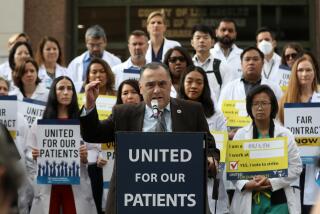Pulse Check of O.C. Doctors Shows More Pessimism
- Share via
Orange County physicians are more pessimistic about access to medical care than are doctors elsewhere in the nation and are more likely to believe patients do not always get the care they deserve, according to a national health-care expert who spoke Friday at a UC Irvine conference.
The dominant theme in the survey of doctors in Orange County “is the turmoil physician organizations are facing,” said Paul B. Ginsburg, president of the Center for Studying Health System Change, a Washington-based think tank.
Surveys and interviews by the group done two years ago show that one-third of county physicians believe they cannot provide high-quality care to all their patients, Ginsburg said. The response was the most negative of sentiments expressed by doctors in the 12 metropolitan areas studied by the center.
In addition, one in four Orange County physicians reported that they “cannot always or almost always obtain referrals to high-quality specialists when medically necessary.” That response was sharply more negative than the average response to the survey, with doctors in just two other areas--Miami and Newark, N.J.--being more pessimistic.
The views of county doctors may be attributable to the prevalence of managed care here, Ginsburg said.
Others at the two-day conference on health care, sponsored by UCI’s Graduate School of Management, noted that in markets heavily dominated by health maintenance organizations, physicians face numerous roadblocks when referring patients to specialists outside their medical plans.
Dr. Terence M. O’Heany, past president of the Orange County Medical Assn., said such a high level of pessimism is driven by the growth of corporate medicine.
“The joy is being taken out because a lot of people who are not doctors are making decisions for your patients,” he said.
O’Heany, who attended the conference along with about 300 health care professionals, said doctors find the managed care setting intrusive and damaging to the doctor-patient relationship.
The need to wait for approvals for esoteric treatments and surgeries creates tensions in practices, he said.
“If you are trying to get someone who should be treated relatively rapidly, let’s say for a bone-marrow transplant, they may be denied or there may be a significant delay,” he said. “Then you are getting harassed by the patient and you are getting harassed by your staff because this situation should be resolved.”
The survey found a correlation between physician concerns and consumer discontent. One in five consumers in Orange County believe their physician might not refer them to a specialist when needed. Only Miami reported a more negative response.
The center is currently conducting another survey in the county and will report updated findings in April.
On a more positive note, the average monthly premium for employer-sponsored insurance was $163 in the county, below the $176 national mean. In addition, annual premium increases were the lowest here at 0.2%, far below the 2% average.
Ginsburg warned that employer-based health insurance is eroding nationwide--with neither of the two major political parties supporting it through public policies. In particular, Ginsburg pointed out there is a sharp decline in insurance coverage for retirees under 65. In 1993, he said, 46% of large employers offered such coverage, but by 1998 the figure was 36%.
“These are people who have no coverage from employers and who are not yet eligible for Medicare,” he said.
This is the eighth year UCI has hosted the conference, intended for health-care providers, especially those running health maintenance organizations or physician groups.
On the first day of the conference, Norman J. Ornstein, resident scholar at the American Enterprise Institute, said the looming 2000 election campaign sharply limits the opportunity for health care legislation, such as changes in Medicare or tax breaks for long-term care insurance.
The greatest likelihood for action, he said, would come from the mutual interest of President Clinton and the GOP-dominated Congress in putting distance between themselves and the impeachment trial and showing that they can do the people’s business.
* COVERAGE: Most Americans happy with their health insurance, survey finds. C1






